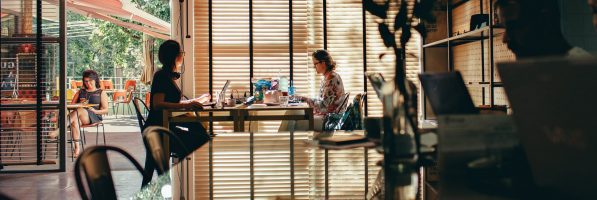Kennesaw Celebrates 25th Anniversary of the Michael J. Coles College of Business

On the 25th anniversary of the renaming of the Michael J. Coles College of Business, Michael Coles is still taken aback.
The Tech Giant Investment in Renewable Energy – Chicago News

Let’s explore some of the most interesting stories that have emerged from Chicago business schools this week.
The New Boom – Mendoza Business Magazine
The Notre Dame University Mendoza College of Business recently discussed why tech behemoths like Google and Amazon have begun to invest heavily in renewable energy technologies—and why this largely U.S. phenomenon is about to go global.
The Mendoza Business Magazine article notes that the reason underlying this new trend is due to the fact that clean energy became cheap energy.
“Once the favorable trajectory of renewable energy economics became apparent, it didn’t take long for some of the world’s largest companies to act. Google and Apple signed trailblazing renewable energy deals in 2012.”
It’s likely that these deals helped generate a domino effect where American and Mexican companies “signed deals for just over 10 gigawatts of renewable energy capacity between 2012 and 2017.”
According to the International Energy Agency, “renewables accounted for nearly two-thirds of new power capacity installed globally in 2016.”
The International Renewable Energy Agency reports that the cost of “generating power from onshore wind turbines and solar photovoltaic panels fell by 25 percent and 73 percent, respectively, since 2010, and predicted that all renewable energy technologies would be economically competitive by 2020.”
According to the school, “The market is ready to ramp up outside the United States, too, in part because U.S.-based multinationals are now looking to buy clean energy overseas.”
You can read the full piece here.
Sarah Siderius Gets the Job Done at Google – UIC Business
The Liautaud Graduate School of Business recently profiled current MBA student Sarah Siderius (’19) whose educational experience at UIC laid the groundwork for her stint as a contractor with Google.org, the philanthropic arm of the tech powerhouse.
Siderius explains how her LinkedIn profile helped her land the position. “As a part of my previous role, I helped my employer establish their philanthropic program. Having this experience on my resume caught this recruiter’s eye, which ultimately led to this amazing opportunity.”
Siderius most recently played an integral role in the Google.org Impact Challenge, Illinois, which awards “$1 million in grants to Illinois nonprofits who are creating economic opportunity in the state.”
She explained that she “enjoyed the fact that she was not only able to work for such an amazing company, but that she was able to give back through her work.”
Find out more about Siderius and her new role here.
How the Coffee Industry Is Building a Sustainable Supply Chain in an Unstable Region – Kellogg Insights
The Northwestern University Kellogg School of Business recently profiled the political and ethical hurdles associated with the newfound excitement surrounding the “quality of Robusta and Arabica” grown in the Democratic Republic of Congo right now. According to the article, “Harvesting, washing, and transporting Congolese coffee beans from the area is fraught with peril, from the dozens of militia groups operating in the east of the country to decades of political instability.”
Assistant Professor of Managerial Sciences and Decisions Sciences Ameet Morjaria, whose research focuses on the East African coffee supply chain, explains, “Development dollars have arrived at the shores of the eastern Congo. For those top dollars to have a lasting impact is not straightforward: farmers are poor, lack support, and struggle to get access to finance.”
“Their trees are old, badly maintained, and low-yielding. On top of that, investors worry about the expense and logistics of getting produce out of the country at volume. And lastly there are issues of insecurity and poor governance.”
Morjaria spoke to two experts on the Congolese coffee industry: SHIFT Social Impact Solutions founder Sara Mason and DRC Producer Group Development Platform Head Angel Mario Martinez Garcia.
Mason explains why it’s essential for companies to continue working in DRC.
“We really hope that in a few years, with positive support from the government, there might be a chance to transform the sector into an agricultural growth opportunity that will fully realize its potential.”
She adds that the actual growers are often vulnerable to exploitation due to extreme poverty, lack of education, and limited ability to communicate with the outside world. “Helping to support strong, transparent producer organizations was one of the drivers for creating the SHIFT DRC Producer Group Development Platform.”
Martinez Garcia says, “A quick fix is never going to work in the Congo. And sometimes it’s a challenge to find someone who’s able to provide resources and time and energy for people to work there in the long run.”
“It is really important to continue supporting producers, to continue increasing skills and knowledge. Because they are the ones, even after we end any activity or any project we have there—in a year or 10 years or 20 years—who will still be there working and living and discussing any future of the coffee sector in the Congo.”
You can read more from Northwestern Kellogg here.
Coffee Brains, Case Writing, and More – New York News

Let’s explore some of the most interesting stories that have emerged from New York business schools this week.
This Is Your Brain On Coffee: Beyond Health Benefits, Even the Smell May Fuel Higher Test Scores – Stevens Institute of Technology College of Business Blog
New research published in the Journal of Environmental Psychology finally confirmed your suspicion: yes, your coffee is making you smarter. Well, maybe. Science is tricky and all that.
In the research, officially released earlier this year, Stevens School of Business professor Adriana Madzharov and colleagues from Temple and Baruch found that the scent of coffee helped people perform tasks better and even improved test scores. Interestingly enough, the researchers concluded that the effect of even just smelling coffee could be as beneficial as consuming it.
“It’s not just that the coffee-like scent helped people in our study perform better on analytical tasks, which was already interesting,” Madzharov writes. “But they also thought they would do better, and we demonstrated that this expectation was at least partly responsible for their improved performance. In short, smelling a coffee-like scent, which has no caffeine in it, still has a placebo effect similar to drinking coffee.”

New research reveals that the scent of coffee can help you with daily tasks and tests, even if you do not consume it.
She adds, “This finding also has useful multiple practical implications in business for workplace professionals, architects, building developers, retail space managers and others.”
You can read the full article here.
A Rutgers Team Brings a Professor’s Lesson to Life – Rutgers Business School Blog
Rutgers Business School Professor of Marketing Can (John) Uslay recently took home first place in a recent case-writing competition put together by the University of Michigan’s William Davidson Institute.
Professor Uslay’s entry was based on Roshni Rides, a “rickshaw transportation company created and piloted by a team of Rutgers Business School students,” which won the “$1 million Hult Prize for social entrepreneurship in 2017 after a compelling presentation about how their company could help improve the lives of refugees living in the Orangi Town settlement.
Professor Uslay outlined “the challenges the team faced, specifically their effort to find a price point that would keep the cost of the service affordable and still enable the company to grow.”
You can check out the full interview with Professor Uslay here.
The Business Case for Sustainable Tourism Management of Protected Areas – SC Johnson Business Feed
Tom Olson, a recent Johnson Cornell MBA graduate, recently published an op-ed about the growing need for “developed, emerging, and frontier markets” to develop more sustainable management structures to accommodate increased tourism.
Enter the Tourism and Protected Area Specialist (TAPAS) Group; a subgroup of the International Union for the Conservation of Nature (IUCN) “dedicated to advancing sustainable tourism initiatives in protected areas.”
Olson writes that he was tasked by TAPAS Group to “analyze, develop, and recommend a revenue generation model that would be financially sustainable, align with IUCN’s values, and be accepted by the broader community of sustainable tourism professionals.”
You can read Olson’s full op-ed here.
Wilfrid Laurier University Earns Fair Trade Designation

Every student understands the importance of coffee. For many, it’s the only thing that gets them up in the morning and keeps them going late at night. And now there’s good news for all those coffee drinkers at Wilfrid Laurier University. Just last week, the school was officially designated as a fair trade campus by Fairtrade Canada. Continue reading…
